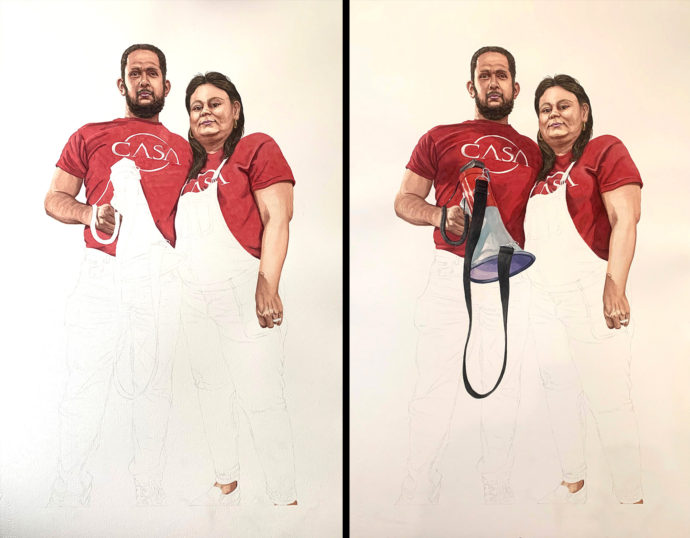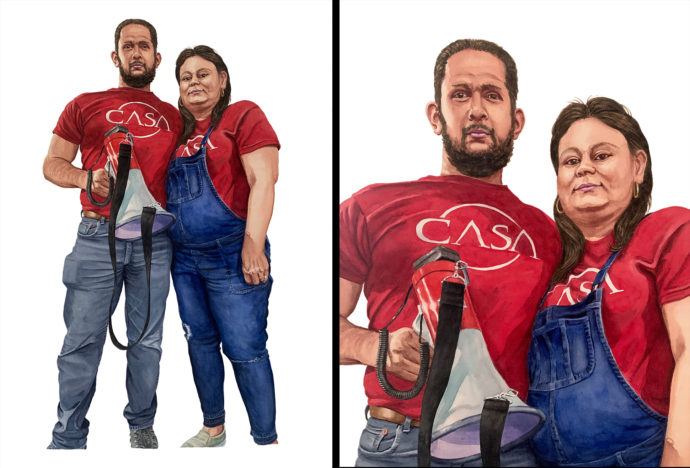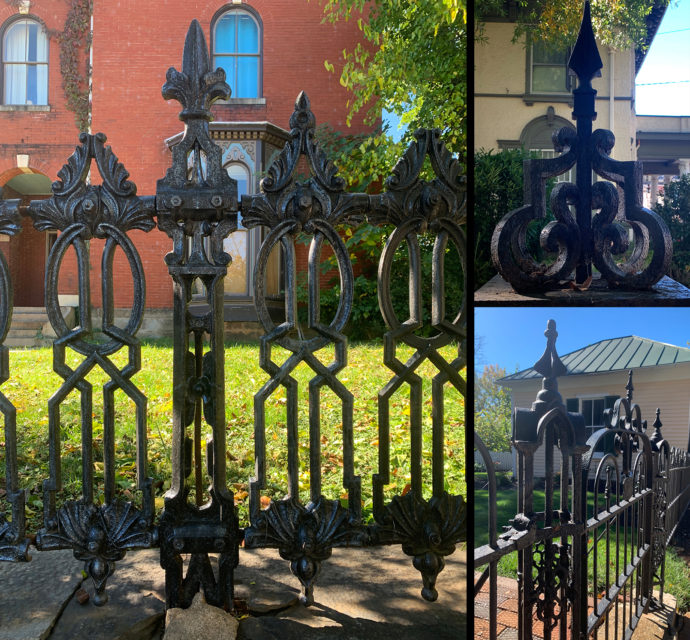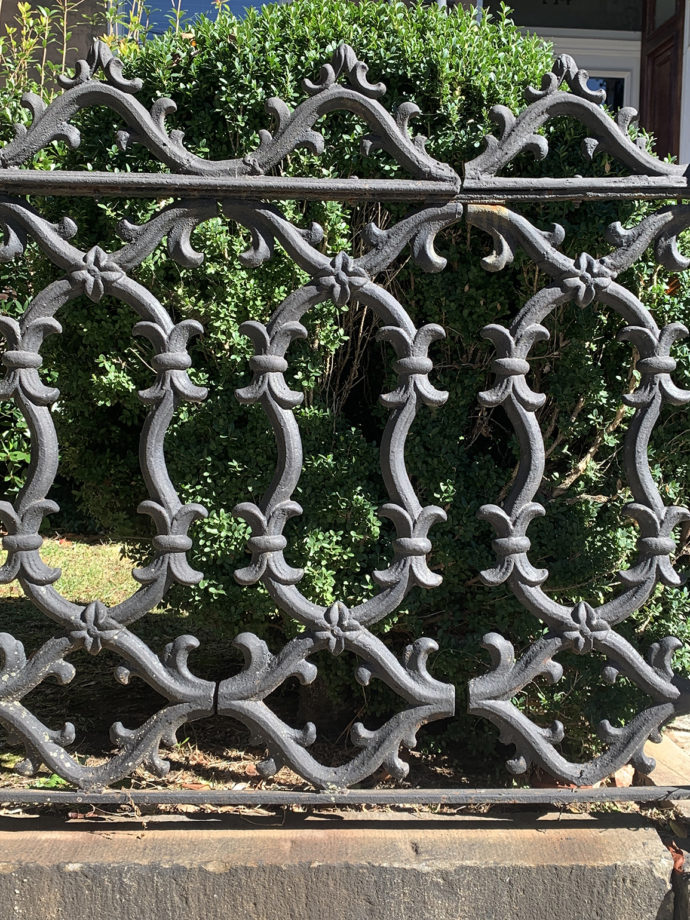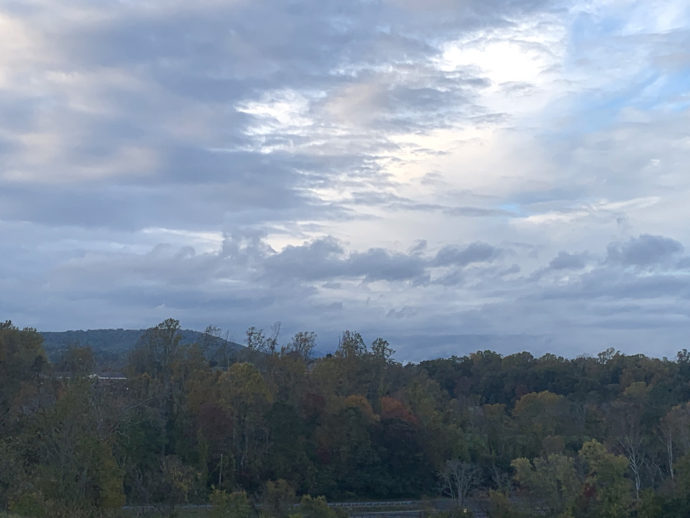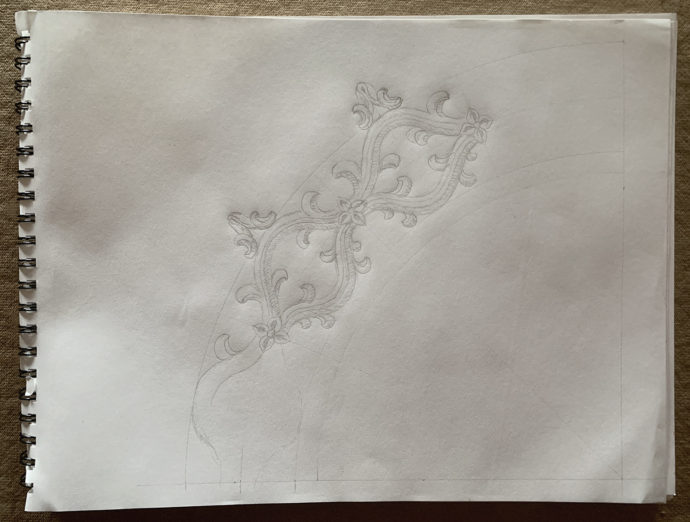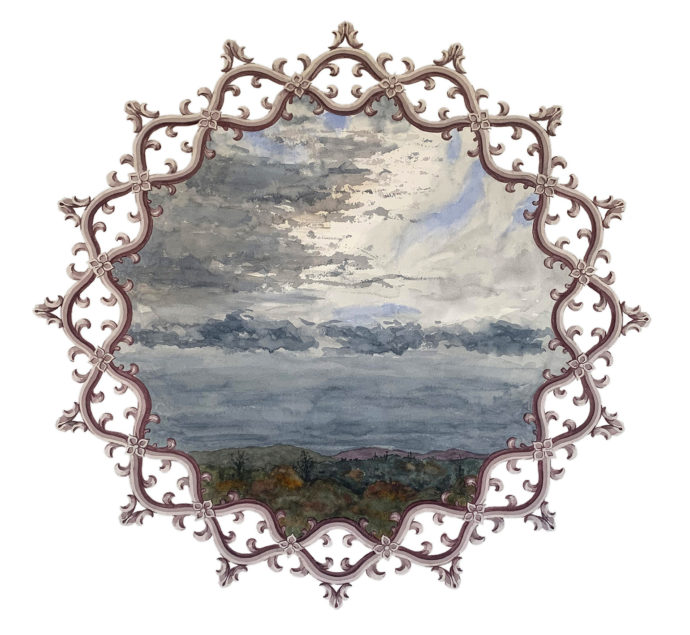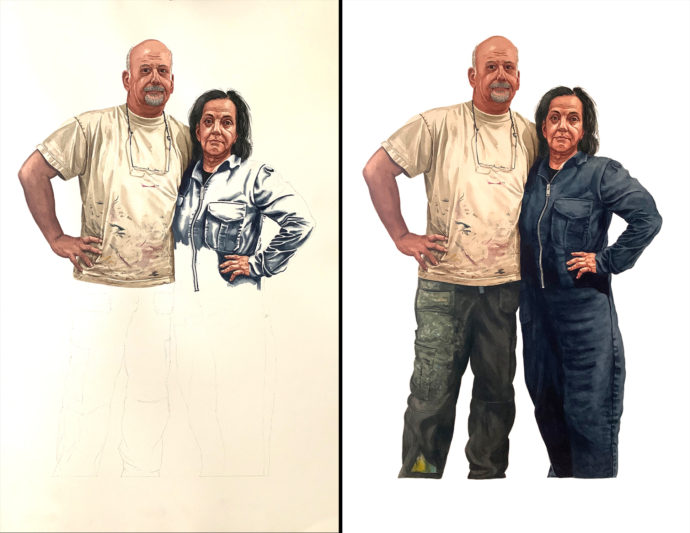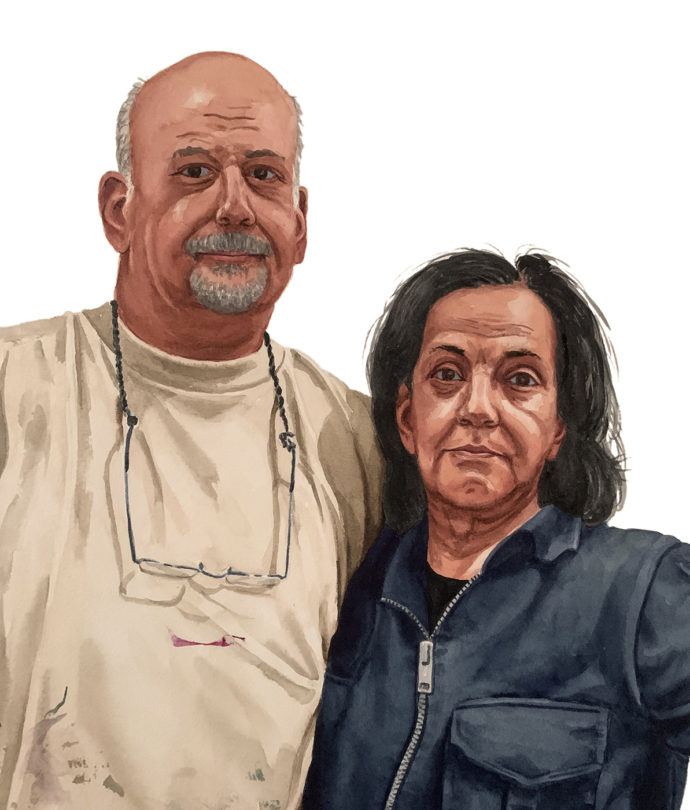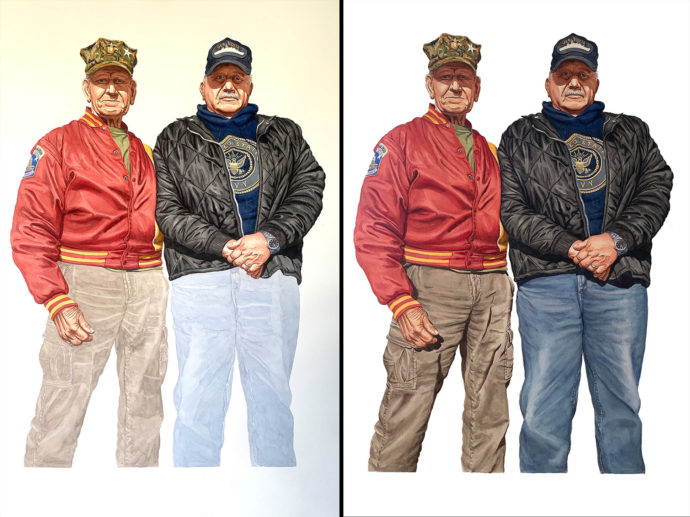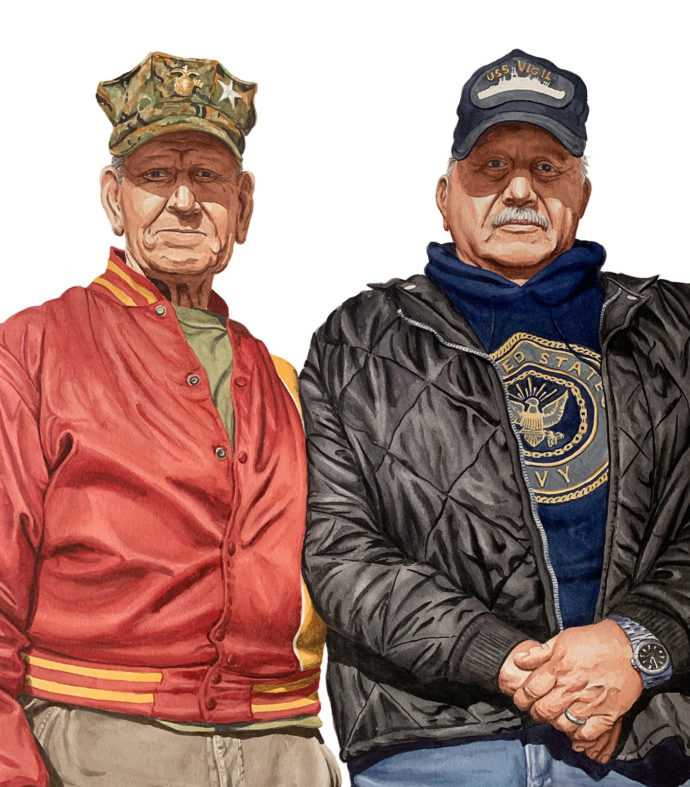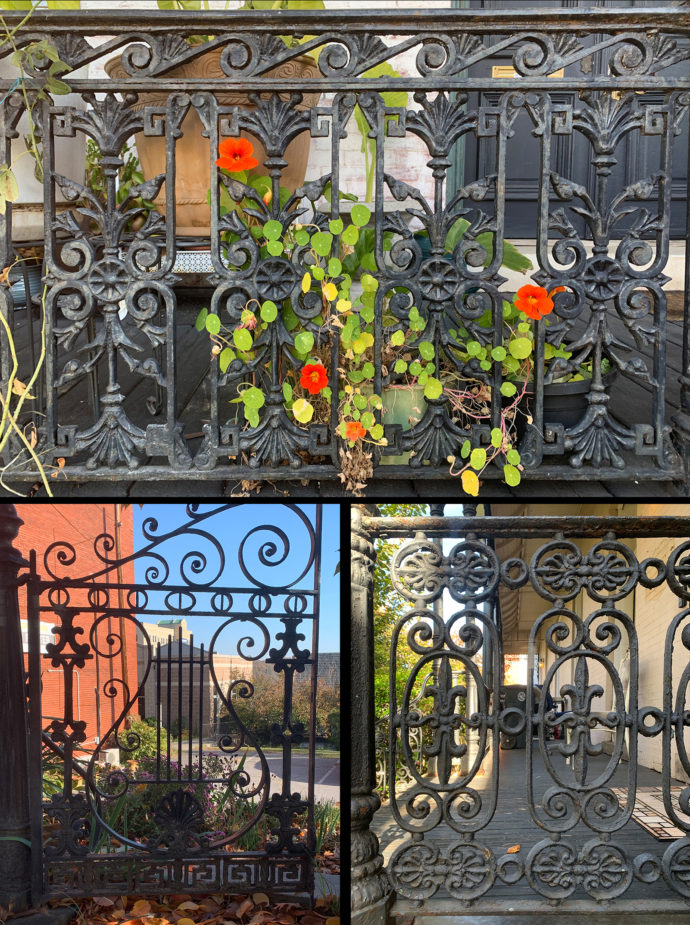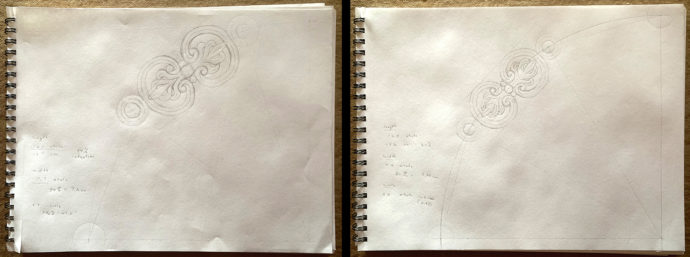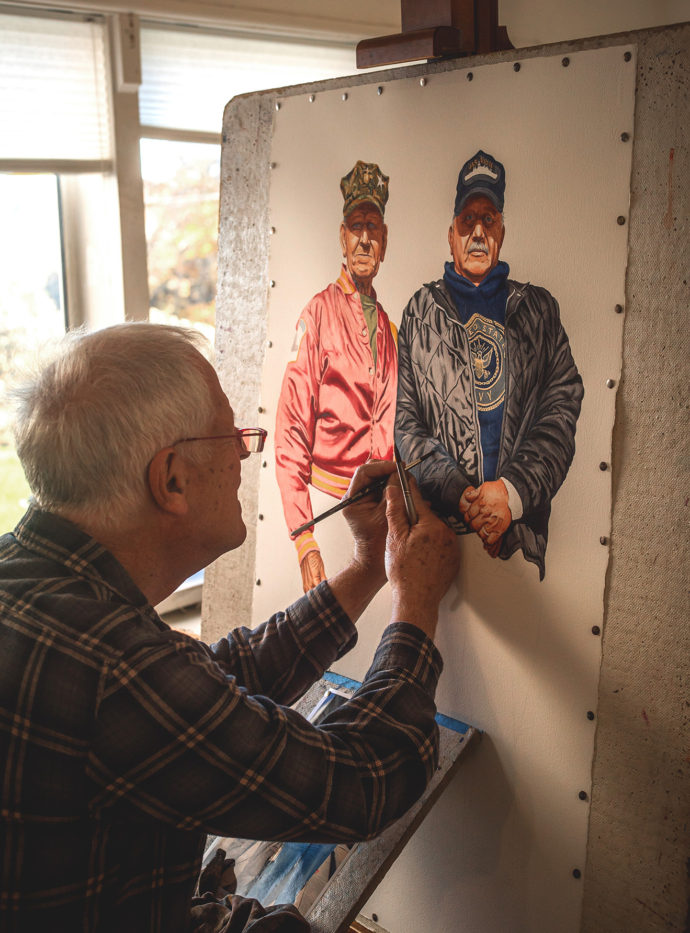VCCA: 3 Weeks in the “Unreal” World
INTRODUCTION
Every morning when I’d walk from the residency hall to my studio, I would stop for a minute or two, take in the expanse of the studio complex at the Virginia Center for the Creative Arts (VCCA) and listen for the birds in the adjacent field to my left and in the woods to my right. My studio was down the hall after entering the red door near the silos. There I’d set to work on one of my “2 by 2” watercolors, each involving a nearly full-length portrait of a couple, who were strangers up to the time I asked them to briefly on-the-spot model for me. (The series is split into two parts: non-COVID (LINK) and COVID (LINK)) My intentions during my three-week residency was to photograph locals, perhaps workers at factories along the James River in Lynchburg or mill workers in the nearby town of Amherst (pronounce the H, as opposed to my alma mater). Neither situations worked out, but the unexpected did. Fortunately!
VCCA
My fourth stay–and my first since 2010–at VCCA quickly confirmed what I like about the place: the community of artists, not just visual artists like myself but writers and composers as well. No matter the endeavor, all residents share what it is to create, what it is to have a career, and what success means to them. Some folks arrive near the start of their career, others in mid-career, others toward the culmination of theirs. At any given time about half are new to VCCA; while others are longtime VCCA veterans. Residencies vary in length from a few weeks to over a month, which creates a fascinating slowly revolving door with some folks leaving and others arriving, particularly on weekends. With room for 22 artists at a time, a stay at VCCA assures opportunities to bond with folks from a variety of disciplines and experiences.
A couple hundred yards from the studios is the residence hall, which includes bedrooms, dining room, several lounges, and laundry. Round tables in the dining room are ideal ad hoc seating, always room to fit in one more and let the conversations take off. Breakfasts are a scattered affair. You quickly learn who the early birds are, like myself. I really have fond memories of breakfast talks with one Virginia novelist and poet. Box lunches arrive around noon at a small kitchen at the studio complex. Some folks take their box to their studio, some eat communallyin the kitchen and some eat outdoors (even in late October and early November–a rare thanks to climate change). But dinner is the real social event. Folks often line up for its 6 pm start. Tables fill quickly. Some artists eat the start of their meal at one table then migrate to another for dessert. Then conversations often continue in the lounges.
The reason meals become so social is because studio time is work time. No knocking on another resident’s studio door unless arranged beforehand.
The site of VCCA is on a former dairy named Mt. San Angelo. The studios are in the barn complex, as shown above. For 42 years VCCA rented the property from Sweet Briar Collage, a women’s school across the highway, until 2020 when VCCA purchased all 412 acres. (More VCCA history is at its website: LINK)
MY Three Weeks
To make sure I had a painting to start off with, I brought photo of a Latinx couple who were demonstrating outside the venue–Center Stage in Baltimore–where President Biden was holding a town-hall meeting in mid-October. Both proudly wore t-shirts for CASA, a grassroots Latin American immigration advocacy group.
“Pavel & Yurt” (watercolor, image 32 1/2″ x 17 3/8″) was completed on 30 October. The next day I headed for Lynchburg, about 15 miles south of VCCA. Online sources suggested there would be some Halloween activities in converted brick industrial buildings near the James River. While I did find folks venturing forth in search of brunch sites–it was Sunday after all–I couldn’t find the promised scene. I did knock on the door of a city-run art gallery, where a couple was preparing an opening. It turned out to be an annual juried show, oddly enough like the one I judged in 1989 during my first stay at VCCA. I explained to the couple that I sought to photograph folks for paintings. And I got a very promising tip: Each Friday at noon military veterans congregated at the memorial plaza opposite City Hall.
A nice tip to have, but Friday was six days away. So I set about exploring Lynchburg’s antebellum residential neighborhoods. How many original owners in the city’s substantial Neoclassical and Victorian houses also owned enslaved Blacks I had no way of knowing. But I assumed many did. None the less, I found myself photographing the cast- and wrought-iron fences surrounding the houses.
And while photographing one fence, I realized the potential for using a fence pattern for one of my Planets watercolors. These circular paintings-or tondos–combine views of skies, which I think as representing the Infinite, with border of a human-made pattern, which I think of as representing the Finite. In other words the Finite is an example of man’s attempt to make a pattern–whether as a language or a decorative art–out of the unknowable, the Infinite. Here’s a link to my Planets portfolio: LINK.
The bottommost horizontal repeat became the basis for a border for the first of two VCCA Planets. As to the needed Infinite sky that was easy. VCCA is in the piedmont of the Appalachians, with Shenandoah National Park only a few miles to the west. I could marvel a great skies from the balcony of my bedroom or from the residents’ carpark nearly.
This sky became the basis for the center of the first VCCA Planet.
But driving back from Lynchburg on Halloween, I realized I didn’t have the size sketch pad I needed for planning out the pattern repetition of the border. The painting was to be about 20″ round. I did bring to VCCA a compass that I would need, but not a pad large enough to plot out a 90º segment of the circle. Fortunately in the return drive to VCCA a Walmart–of all places–saved the day.
This is the sketch I did to plan the border on the first VCCA Planet. This was my first and only effort to work out a repeat. I drew out 2 segments of the 4 that would fill a quarter or 90º of the border. Ergo there would be 16 repeats over the circumference of the border.
“VCCA Planet A” measures 22″ on paper 26″ square. It was completed on 2 November.
Still lacking a local couple of Virginia natives to paint–with Friday and the predicted Veterans’ gathering three days away–I turned to an even more local source: fellows VCCA artists. Two painters Danny with his oil-paint streaked clothes and Glynn with her stylish blue jumpsuit posed for me. (I don’t use models’ full name; nor do I show the photographs that I made when they modeled. For that matter I won’t name any of the artists–with one exception–at VCCA since I didn’t explicitly ask if I could.)
“Danny & Glynn” (watercolor, image 31 5/8″ x 21 1/2″) was completed 6 November. (As always I tell the subjects that I would use their first name to title the painting should I make a painting from their photograph.)
The day before finishing “Danny & Glynn” I did make it to where veterans congregate every Friday at noon in Lynchburg. In fact I was early and got a chance to chat up two guys wearing jackets and hats that proclaimed their veteran status. How was I an artist who avoided the Vietnam-era draft going to introduce myself to folks who took their military service so proudly. I told them the truth: “My Dad was a navigator in a bomber that was shot down over Naples. He became a POW in camps in Germany, survived a six-month bout of hepatitis and was liberated after 21 months.” I was IN and soon was regaled with all types of service tales. Daniel in the red jacket was 92 years old and serviced a peace-keeping stint in newly independent Israel. Len served on the Liberty Ship USS Vigil. (See his cap.) Both after their military service became policemen. I asked both if they were young men today would they consider becoming policemen now. And both said no, that today they couldn’t do their job with so many restrictions regarding subjects’ rights. They preferred the days of stop-and-frisk.
I was a very good audience for their anecdotes of military service until I eventually pointed to each one and said: One more story from you and one more story from you. I gave my business card to each, but neither of them contacted me. So I couldn’t email them photos of themselves. (Not hearing back from modeling subjects has been nearly unanimous.)
But let me back up because “Daniel & Len: Veterans” was not completed until 23 November, nine days after I left VCCA. In fact I purposely left it with the trousers only lightly painted in. (See left-hand image in the composite above.) I’ll explain why later.
In fact-In fact, I didn’t start painting “Daniel & Len” until I completed the second VCCA Planet. In fact-in fact-in fact, before I met Daniel and Len, I photographed more cast-iron fences not far from where the veterans would assemble…
…and chose to make a Planet border from the paired anthemions that run both top and bottom of the fence in the lower right photo. I liked the idea of alternating VCCA paintings between “2 by 2” and Planet. So with photos of veterans in hand, I set about to paint another Planet.
First I plotted out the proposed border with two and a half repeats per quarter round (on the left) and thought it would overwhelm the sky. Then I plotted out a smaller border–now three repeats per quarter–and liked it. Instead of a circular border as in “VCCA Planet A” this border would be 12 sided or a dodecagon.
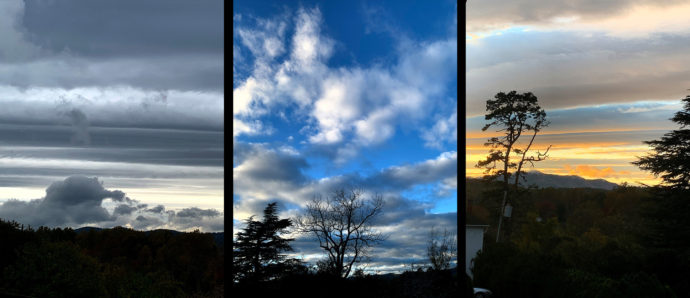 Of the three skies I had recently shot, I chose the center one with its brilliant blues for the centerpiece of the second VCCA Planet.
Of the three skies I had recently shot, I chose the center one with its brilliant blues for the centerpiece of the second VCCA Planet.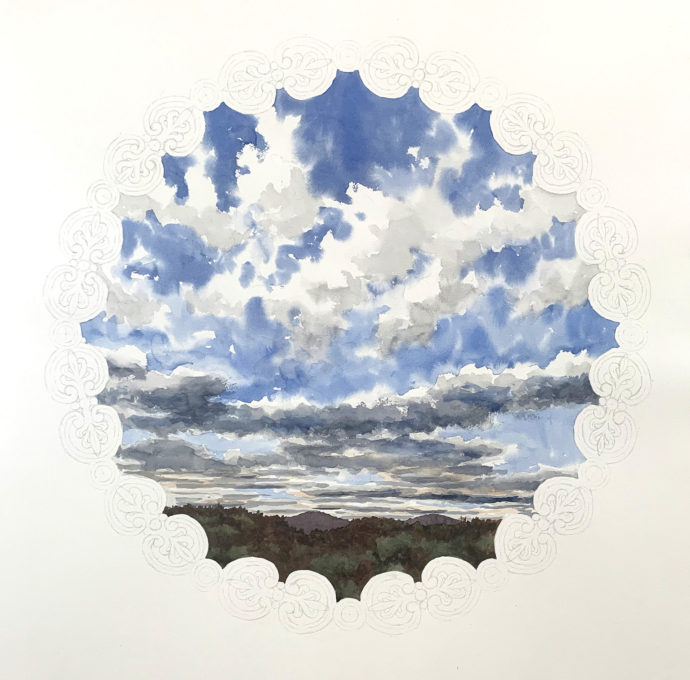
As always I painted the sky first. Painting skies involve rather loose, spontaneous brushwork that doesn’t always stay within the lines. (I seek out the idea of the photographed sky without trying to adhere closely to it.) I know the more precisely painted borders would cover up any slipping over the lines. The tree-covered hills and distance mountains are only vaguely related to any view I photographed.
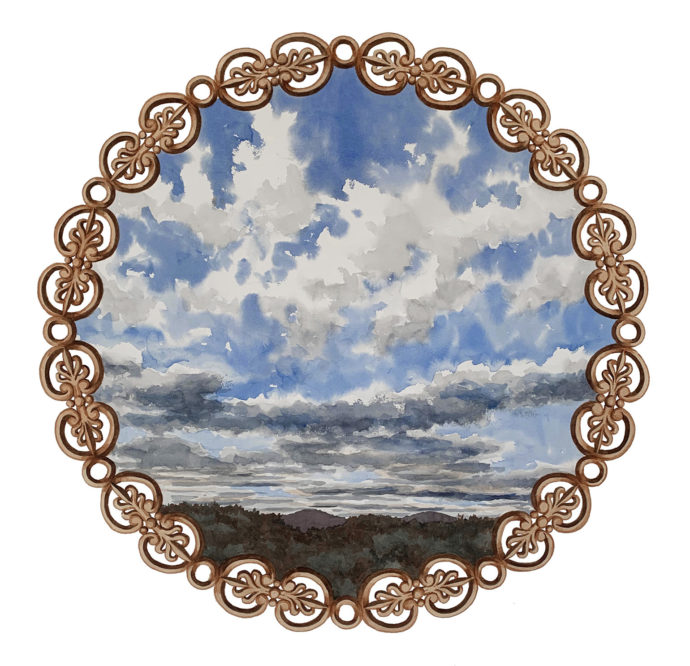
“VCCA Planet B” (watercolor, 21 1/2″ across) was completed 10 November.
That left three days to paint Daniel and Len, the veterans. If I lock myself in the studio for those days, I knew I could pull it off. But what was the point? I could easily finish at home. So far I had failed to traverse but a few of VCCA’s 412 acres as many other artists had done. I had barely seen any of the countryside. One artist–Christopher Risch, a videographer from Richmond–would save the day two ways.
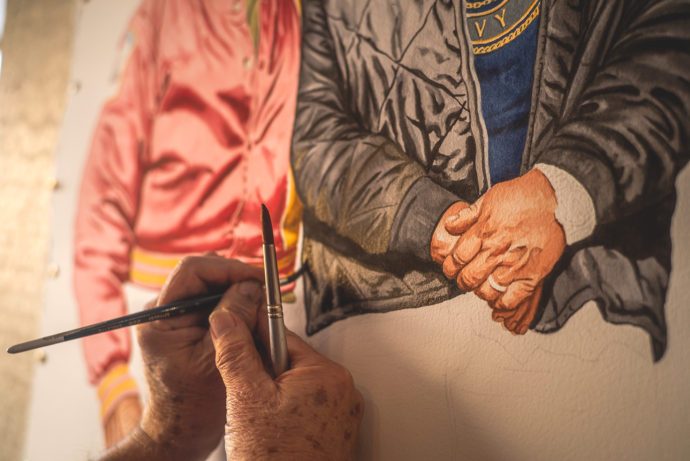
He not only documented my painting of “Daniel & Len” and reminded me that I look my 72 years, but he made arrangements for my next-to-last afternoon at Woodson’s Mill, originally built in the 1790s. There I met three young guys who operate it and an older gentleman with the last name of Woodson. His family sold the mill when he was a young man. (When I left for VCCA I had expected to visit the mill in Amherst. I had done so in previous residencies and bought freshly ground grits and corn meal. And that was one of the places I had hoped to photograph pairs of workers. But I googled the Amherst mill after arriving at VCCA, I found out the mill has become a brewery.)
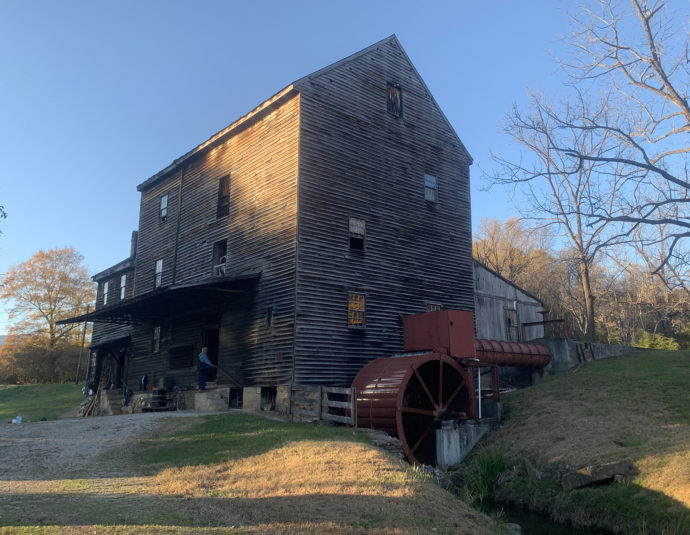
I won’t say more about the mill because I plan to devote a whole blog post to it. But I will say I’ve shot several short videos of its operation, and I have contacts for all the guys I met there. Plus I have permission from the owner to do a post on the mill.
Oh, and why did it take nines day before I completed the veterans’ painting. There’s a sign at the end of drive at VCCA before entering the highway. It simply reads “Real World.” I didn’t immediately finish “Daniel & Len” because the real world is complicated. So much more to consider than when to hit the studio and who to sit with at dinner. But I don’t have to tell you that.
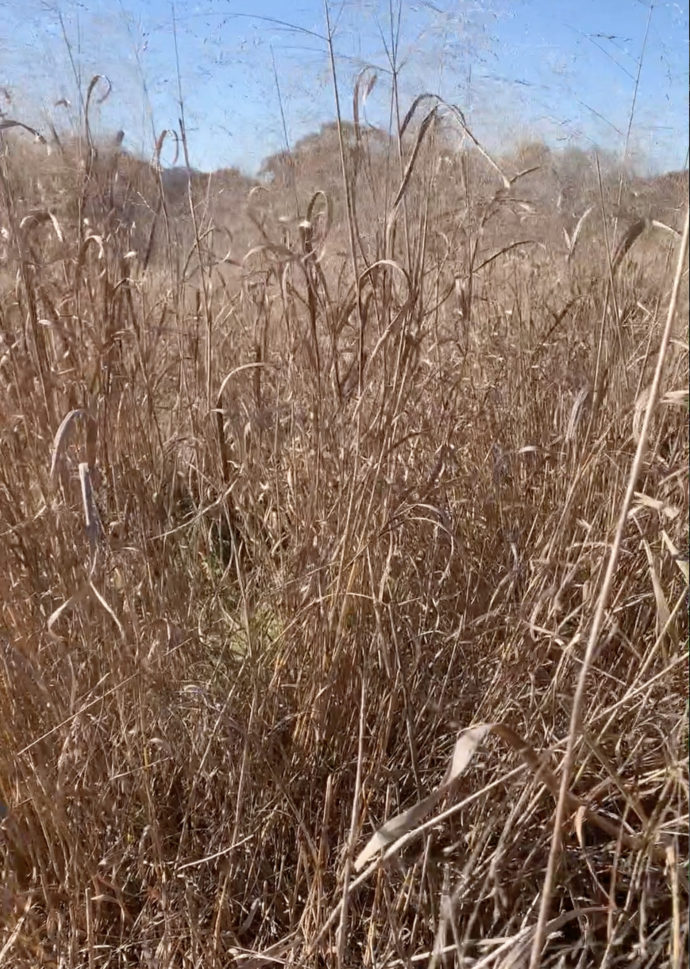
And for my last afternoon at VCCA, I did a bit of roaming, past the cattle barn, past the stone bridge, through the woods and out into a field of 5-foot-high grass. If you click on the video link below, you can see the breeze buffet the stalks, which rattle their thanks in return.
http://www.scottponemone.com/wp-content/uploads/2021/12/VCCA-Grass-field.mov
That should open in Safari and Firefox browsers, but in Chrome a link to the video that will appear in the lower left of your screen.
Epilog
Now that I’ve blogged about my residency, it’s time to move on…well, almost. To keep the rotation alive between planets and couples, I think, if I can design another border based on a Lynchburg fence, I’ll do another VCCA Planet. I certainly have some inviting VCCA skies to work from. And as to another couples painting, I did photograph several pairs of Woodson’s Mill workers. So I did come away with mill worker images, just not those at the former mill in Amherst.
Comments
I greatly appreciate your comments. to do so, just email me at: p1m1@comcast.net
Trackback URL: https://www.scottponemone.com/vcca-3-weeks-in-the-unreal-world/trackback/


